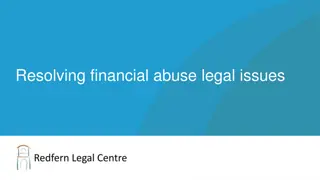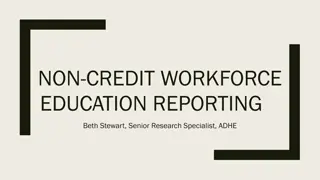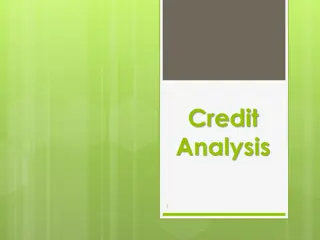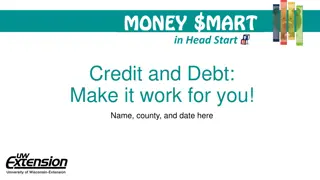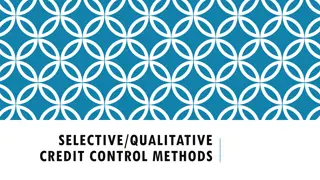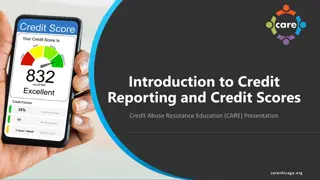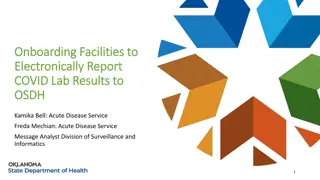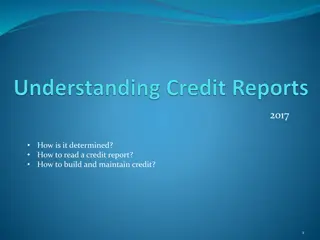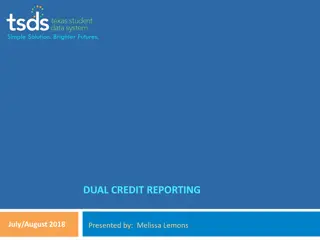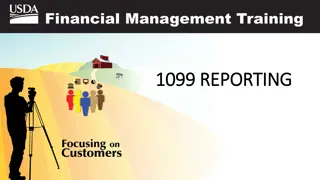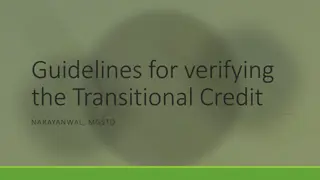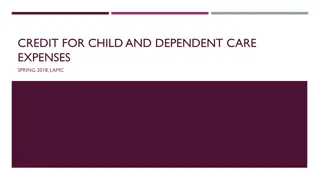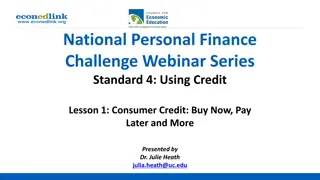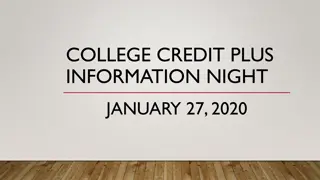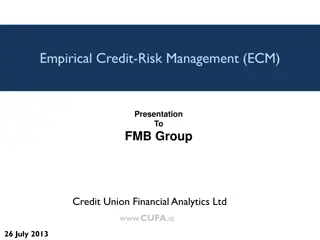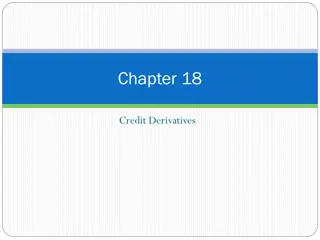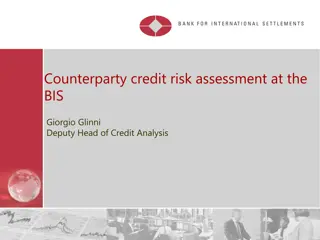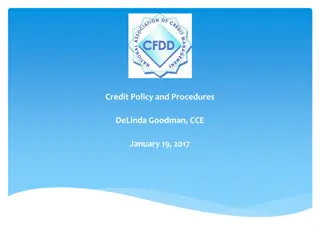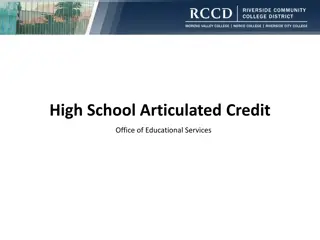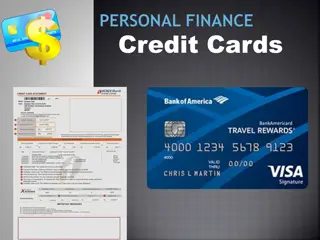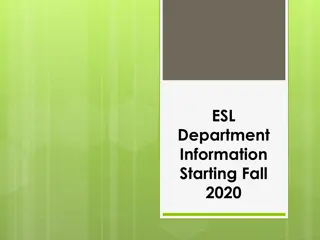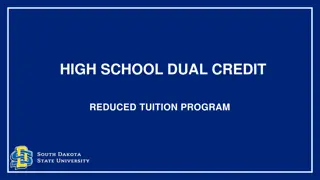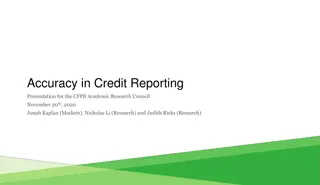ECC Social Value Reporting and Evaluation Framework
Essex County Council (ECC) has implemented a robust Social Value Reporting and Evaluation framework based on the Local Government Association's National TOMs method. This framework categorizes and assesses social value contributions in two parts - Value Score and Supporting Statement Score - to deri
3 views • 16 slides
Dual Credit Options at Champion High School
Champion High School offers Advanced Placement (AP) and Dual Credit programs in partnership with various institutions like Northwest Vista College, Angelo State University, UT On-Ramps, and Tarleton Today. Students can earn college credit by meeting testing requirements, with some classes being free
1 views • 14 slides
Resolving Financial Abuse: Legal Issues and Consumer Credit Law
Learn about resolving legal issues related to financial abuse, consumer credit law, crafting financial hardship requests, negotiating with creditors, getting specialist legal advice, and testing your knowledge on financial matters. Gain insights into consumer credit law, the National Consumer Credit
0 views • 67 slides
Arkansas Workforce Education Reporting Update
Reporting requirements for non-credit workforce education in Arkansas have been updated to include student-level reporting starting in AY2019. Changes apply to the Arkansas Workforce Challenge Scholarship Act 605/606 of 2009, with a new file format for student reporting and required data elements fo
0 views • 10 slides
Understanding Credit Analysis for Farmers and Fishers
Credit analysis is crucial for farmers and fishers to access the right amount of credit at the right time. Economic feasibility tests such as returns on investment, repayment capacity, and risk-bearing ability are essential factors to evaluate credit worthiness. The 3Rs of credit - returns, repaymen
0 views • 30 slides
Understanding Credit Reports and Scores: A Comprehensive Overview
Explore the importance of credit reports and scores in financial empowerment through modules on reviewing credit reports, understanding credit scores, and mastering credit basics. Learn how good credit can impact your ability to obtain loans, credit cards, secure rentals, insurance coverage, and emp
3 views • 35 slides
Mastering Credit and Debt in Head Start Program
Understand the complexities of credit and debt to make informed financial decisions. Learn about different types of credit, pros and cons of credit cards, debit cards, prepaid cards, and secured credit cards. Gain insights on how to manage your finances effectively and build a strong credit history
0 views • 29 slides
Qualitative Credit Control Methods Explained
Selective/Qualitative credit control methods involve regulating the quality and direction of credit flows by implementing controls such as ceilings on credit, margin requirements, discriminatory interest rates, directives, direct action, and moral suasion. These methods are used by central banks lik
0 views • 7 slides
Understanding Credit Reporting and Credit Scores in CARE Presentation
Explore the essential concepts of credit reporting and credit scores in the context of Credit Abuse Resistance Education (CARE). Learn about credit history, its impact on financial decisions, ways to establish credit, the significance of credit reports, and how credit behaviors affect one's financia
0 views • 21 slides
Streamlining Electronic Reporting of COVID Lab Results to OSDH
This documentation outlines the process of electronically reporting COVID lab results to the Oklahoma State Department of Health (OSDH). It covers the purpose, available options, specifications, formats, and the onboarding and testing process, aiming to accelerate the reporting of healthcare facilit
0 views • 9 slides
Understanding Credit Cards: A Beginner's Guide
Explore the basics of credit cards, including how they work, differences from debit and prepaid cards, obtaining one, and building credit. Learn about credit character, revolving credit, and tips for getting approved for a credit card. Discover the importance of good credit and income when applying
0 views • 20 slides
Understanding Credit Reports and Building Credit in 2017
Understanding credit reports is essential for financial well-being. A credit report is a record of your payment history on loans and credit cards. This report is used to calculate your credit score, which determines your creditworthiness. Building and maintaining credit involves making payments on t
5 views • 22 slides
Dual Credit Reporting Guidelines for College Courses
Dual Credit Reporting provides definitions, guidelines, and validation rules for reporting college courses that allow students to earn both high school and college credit. Key elements covered include credit indicators, college credit hours, course sequencing, and validation rules to avoid overrepor
0 views • 6 slides
Overview of 1099 Reporting Systems
The 1099 Reporting Systems consist of MINC, EARN, and SPPS, which are used for IRS 1099 reporting purposes. These systems handle transactions and generate Form 1099 for recipients based on predefined criteria. Taxpayers are responsible for accurate reporting to the IRS, with reporting thresholds set
0 views • 15 slides
Guidelines for Verifying Transitional Credit and Important Authorities' Orders
The guidelines for verifying transitional credit include directives from the Hon'ble Supreme Court, the opening of a common portal for filing forms, the verification process timeline, and the reflection of approved transitional credit in the Electronic Credit Ledger. Relevant orders and circulars fr
1 views • 19 slides
Understanding Child and Dependent Care Expenses Credit
The Child and Dependent Care Expenses Credit allows taxpayers to reduce their tax liability by a portion of expenses incurred for caring for qualifying persons. Qualifying persons include children under 13, incapacitated spouses or dependents, and certain criteria must be met to claim the credit. Th
8 views • 10 slides
The Case for Private Credit Investments in the Global Market
Private credit investments are gaining significance in the global market, offering innovative financing solutions outside traditional avenues like public markets. With a focus on innovation, independence, and integrity, private credit investments cater to diverse sectors such as real estate, natural
1 views • 9 slides
Take Control of Your Credit Report: A Comprehensive Guide
Learn how to take control of your credit report, understand why it matters, spot credit repair scams, and fix mistakes. Discover why your credit history is important and how to get your free credit reports. Explore the significance of your credit score, review your credit reports, and know how to ha
0 views • 16 slides
Understanding Consumer Credit: Buy Now, Pay Later and More
In this webinar series, Dr. Julie Heath discusses the importance of consumer credit and the implications of buying on credit. Through real-life scenarios involving high school seniors and college students facing financial decisions, students are encouraged to weigh the pros and cons of using credit.
0 views • 15 slides
UNEP Support for Improving UNCCD Reporting Procedures
UNEP has been providing support since 2010 to enhance the reporting processes of the UNCCD, focusing on streamlined funding approaches, technical assistance, and capacity building. Key outcomes include the development of reporting tools, online reporting systems, and building credible data from coun
0 views • 14 slides
Understanding Business and Credit Cycles in Agriculture
This research delves into the relationship between business and credit cycles in agriculture, focusing on the impact on operating margins, farmland prices, and lending practices. It explores the linkage between asset values and credit, highlighting the significance of farmland as collateral in farm
0 views • 23 slides
Enhance Your Credit Profile with CPN Numbers
If you're looking to improve your credit profile, CPN numbers (Credit Privacy Numbers) can be a powerful tool. A CPN number is a nine-digit identifier that can be used in place of your Social Security Number (SSN) for credit reporting purposes. While
2 views • 2 slides
Climate Change Monitoring, Reporting, and Verification (MRV) Training Session Overview
This document outlines the purpose and reporting requirements for the development of a Climate Change Monitoring, Reporting, and Verification (MRV) system, focusing on projections and scenarios. It highlights the importance of collecting information for climate mitigation, assisting Serbia in meetin
0 views • 19 slides
Transitioning to Incident-Based Crime Reporting: Enhancing Transparency and Accountability
Anytown Police Department (APD) is leading the transition from Summary Reporting to Incident-Based Reporting through the National Incident-Based Reporting System (NIBRS). This change promotes transparency, provides detailed crime data to the public, and improves statewide and national crime statisti
3 views • 17 slides
College Credit Plus Information Night - Benefits, Challenges, and Considerations
College Credit Plus (CCP) offers students in grades 7-12 the opportunity to earn high school and college credit simultaneously. This program has advantages such as cost-free college credit, textbooks paid for by Padua, and the ability to graduate early. However, potential challenges include impacts
0 views • 16 slides
Empirical Credit Risk Management at FMB Group Credit Union
Empirical Credit-Risk Management (ECM) presentation to FMB Group Credit Union by Financial Analytics Ltd discusses the background, traditional forecasting methods, income and risk recognition, provisioning approaches, and benefits for credit unions. ECM offers expert retail credit risk management th
0 views • 25 slides
Understanding Credit Instruments and Negotiable Instruments
Credit instruments play a crucial role in modern business by facilitating the transfer of money between lenders and borrowers. These instruments, such as Payroll Credit, Book Credit, and Documentary Credit, come in various forms like oral agreements and written documents. Negotiable instruments, on
0 views • 11 slides
Simpler Systems Reporting Pilot for Financial Data Enhancement
The Simpler Systems Reporting Pilot is underway to enhance financial data reporting at the university campus. Led by Vice President Ryan Nesbit's team, this initiative aims to improve University-wide financial reporting mechanisms and accessibility to data through the Simpler tool. The pilot include
0 views • 5 slides
Understanding Credit Derivatives and Managing Credit Risk
This chapter delves into credit derivatives, exploring their purpose, types such as credit default swaps and total return swaps, and the development of the market over the years. It discusses credit risk, problems associated with it, methods for estimating credit risk, and the role of credit derivat
0 views • 35 slides
Ensuring Chemical Reporting and Preparedness at the DEQ
The Chemical Reporting and Preparedness section at the DEQ focuses on regulations under EPCRA, prompted by incidents like the Bhopal tragedy. EPCRA covers Tier II reporting, spill reporting, LEPCs, State Emergency Response Commission, and Oklahoma Hazardous Materials Emergency Response Commission. T
0 views • 17 slides
Principles of Credit in Agricultural Financing
Explore the key principles guiding credit in agricultural financing as outlined by Dr. J.P. Singh, including the Five Cs of Credit and the Seven Ps of Credit. Learn about the importance of factors such as productive purpose, productivity, and proper utilization in ensuring successful lending practic
0 views • 7 slides
Counterparty Credit Risk Assessment at the BIS: Approaches and Factors to Consider
The presentation discusses various approaches for assessing counterparty credit risk at the BIS, including full reliance on external ratings, internal risk assessment, and combinations of both. Factors such as credit risk exposures, regulatory requirements, organizational impact, skillset availabili
0 views • 36 slides
Market Credit Working Group Update to Wholesale Market Subcommittee
The Market Credit Working Group provided updates to the Wholesale Market Subcommittee regarding NPRR review, focusing on NPRR 1088 which addresses credit impacts related to the elimination of RFAF and DFAF applications to prior and ongoing market positions. The discussion revolved around ERCOT credi
0 views • 8 slides
Feedback Analysis on Medication Incident Reporting in Hospitals
Feedback received from IMSN members on NIMS and incident reporting revealed various issues affecting the rates at which staff report medication incidents/near misses within hospitals. Major themes included staffing numbers and turnover, pharmacist involvement in incident reporting, clinical pharmacy
0 views • 12 slides
Understanding the Importance of Credit Policies in Business Operations
A credit policy/manual serves as a comprehensive guide detailing rules, regulations, and procedures within a company. It helps new employees understand the company's credit processes and establishes clear guidelines for decision-making. Without a credit policy, conflicts may arise in approving credi
0 views • 9 slides
Understanding High School Articulated Credit: Benefits, Transferability & Responsibilities
High school articulated credit allows students to earn college credit by aligning high school CTE classes with college-level courses. This collaboration between high school teachers and college professors can save students time and money by reducing the need to repeat coursework in college. Students
0 views • 8 slides
All About Credit Cards: A Comprehensive Guide
Explore the world of credit cards, from understanding the basics to managing credit wisely. Delve into the advantages and disadvantages, learn about different types of credit cards, and discover how to use credit cards responsibly. Discuss whether high school students, college students, and adults s
0 views • 36 slides
Comprehensive Information on ESL Department's Fall 2020 Offerings
Explore ESL class options starting Fall 2020, including credit vs. non-credit courses, new course offerings, course numbering system, differences between credit and non-credit classes, and more. Discover details on certificates, financial aid, graduation, and transfer information, with insights on c
0 views • 12 slides
High School Dual Credit Reduced Tuition Program Information
The High School Dual Credit Reduced Tuition Program allows eligible high school juniors and seniors in South Dakota to take General Education courses at a reduced tuition rate of $48.33 per credit. Students can fulfill high school requirements while earning college credit, jumpstart their post-secon
0 views • 31 slides
Evolution of Credit Reporting and Consumer Awareness
Credit access is crucial for consumers, yet inaccurate credit reporting can have significant impacts on credit scores. Studies show that errors in credit reports are common, with many consumers disputing inaccurate information. The regulatory landscape has evolved since the 2012 FTC study, with incr
0 views • 10 slides


